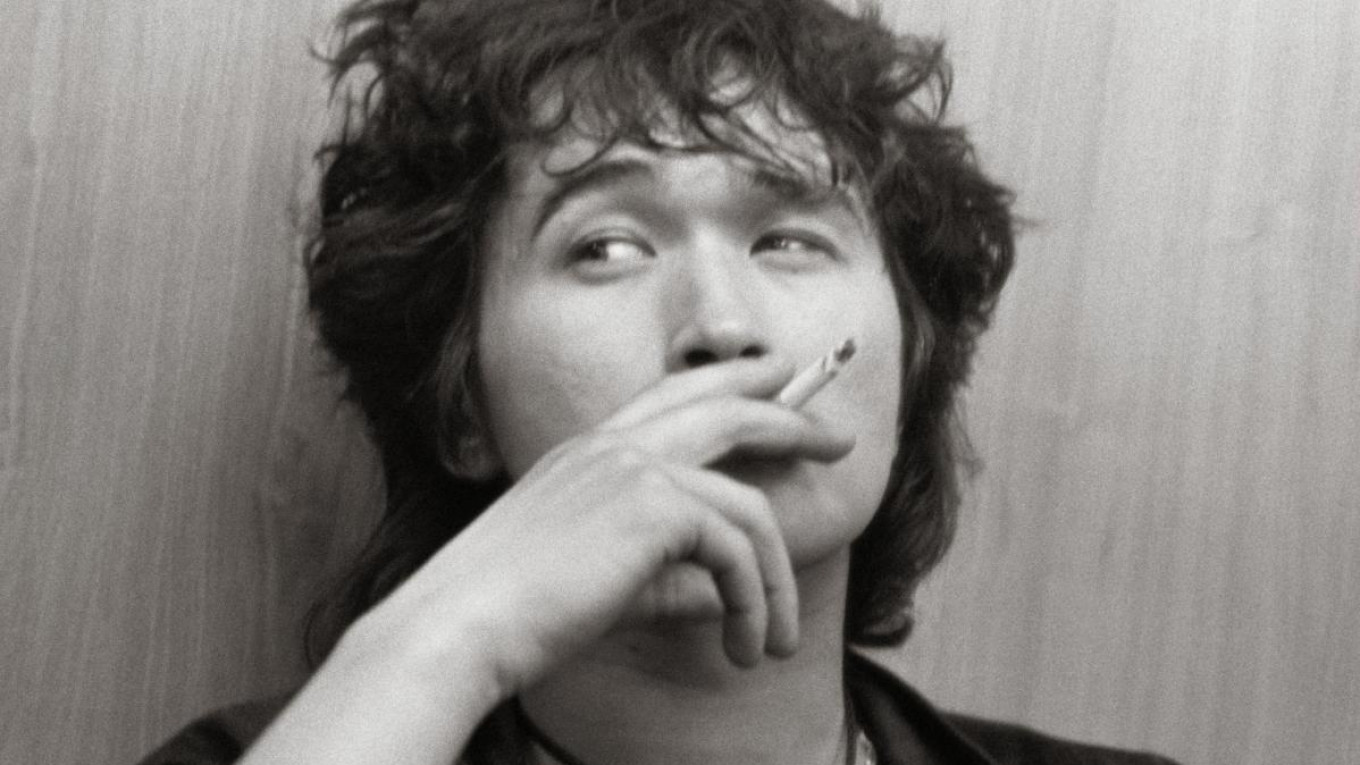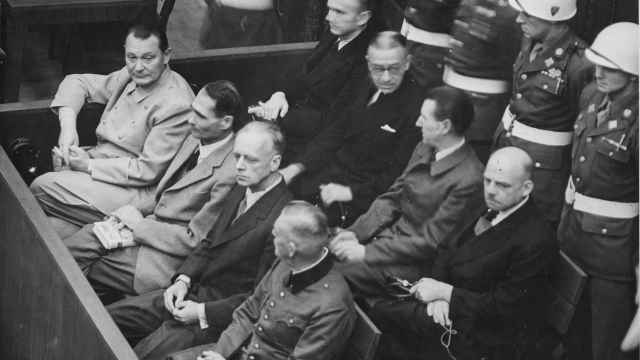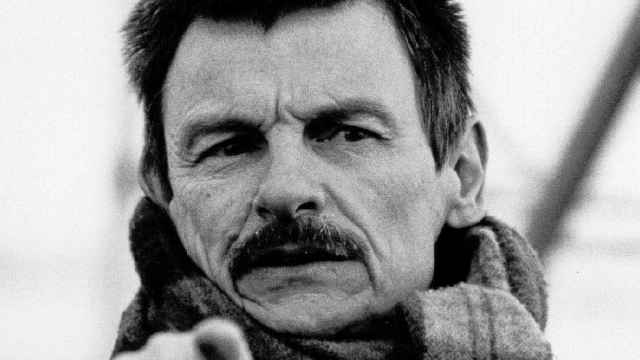It’s "great music-urban Russia-national conscience week" on Moscow TV. The small screen offers viewers fine films that reveal a lot: how Igor Stravinsky cruised Hollywood Boulevard in the 1950s and Leningrad’s underground musicians pioneered Soviet rock ‘n’ roll in the 1980s; why the suddenly-controversial Khrushchev-era apartments are suddenly controversial; how the admirable Daniil Granin came to symbolize Russia’s greatest generation; and whether the mystery of the deadly 1937 census can finally be solved. Here’s the where and when:
On MONDAY the Istoriya channel clinches this week’s Frontburner Topic Award with Yelizaveta Listova’s documentary “The Khrushchev Apartment Buildings” (2006). Moscow Mayor Sergei Sobyanin has vowed to tear the khrushchyovki down, of course, and partisans on both sides of this decision – which, ahem, may or may not have originated with the mayor – are becoming increasingly heated and vocal as the weeks go by.
Why has tearing down ugly, boxy, gray, overused five-story units from the 1950s – with no elevators and ceilings pegged at a claustrophobic 2.4-meter height – become such a big deal? One reason is that these speedily-mounted housing-crisis stopgaps have a kind of “heroic” history: They were nothing short of the Promised Land to those families lucky enough to receive them. As the film’s trailer puts it,
“For the first time in the history of the Soviet Union, the government had turned toward the people, implementing the largest social project in the history of the USSR…[And] paradoxically, the most nondescript structures of the Soviet empire became the brightest moments in the lives of many millions of the empire’s citizens, for these were – their own apartments! No more nasty communal-flat neighbors, poisoned soup and lines for the bathroom.”
Put otherwise, it isn’t just that some people fear giving up a prime city location for some sketchy development out in the Moscow region, or that others object to affordable urban housing being torn down so some “close friend of a highly placed official” can throw up high-end apartment buildings at an exorbitant mark-up. No, the khrushchyovki also are for many the proverbial “poor thing but mine own.”
Even if their exteriors actually “exacerbated the dullness and monotony that already characterized Soviet daily life,” the buildings became an ongoing reminder of salvation from an impoverished postwar life and the beginning of a humble but independent family history. Tune in this episode of the commendable Soviet Empire series and see how such histories were started for millions.
The Soviet Empire: “The Khrushchev Apartment Buildings” / Советская империя. Хрущевки. Istoriya, Monday at 6:00 a.m. and Tuesday at 1:05 a.m.
It seems perfectly natural to think of Igor Stravinsky as a European; but the Russian-born composer, whose most famous works were indeed written in and for the Old World, in fact lived longer in Tinseltown than anywhere else – which is the first thing the viewer learns from Marco Capalbo’s fascinating documentary “Stravinsky in Hollywood” (2014), airing TUESDAY on Kultura.
After a European life of musical triumph and personal complexity, Stravinsky arrived in Hollywood in 1940 at age 57 as the world’s most famous composer – and stepped right into the mainstream, collecting a $6,000 check from Walt Disney for the use of “Rite of Spring” in “Fantasia” and conducting his “Firebird” suite in the Hollywood Bowl. By the time he left Los Angeles for New York in 1969, the composer had a star on the Hollywood Walk of Fame and an outsized reputation for music that could even do “the seemingly impossible – upstage [Orson] Welles.”
But the focus of this feature, as the Los Angeles Times critic put it, is to show how “L.A. helped Stravinsky resolve an artistic crisis and invent a new, late [compositional] style.” And Capalbo’s signal contribution, the Times went on, lies in contrasts: “The value of the film is to give a human face to what is too often thought of as Stravinsky's most severe and forbidding music by dramatically pitting the composer as a man of order against a Hollywood of chaos.” If a stern Russian taming chaotic Hollywood doesn’t intrigue Moscow viewers, it’s hard to imagine what will.
Stravinsky in Hollywood / Стравинский в Голливуде. Kultura, Tuesday at 5:50 p.m.
Later on TUESDAY viewers get a good and useful talking to from the greatest citizen-writer you’ve probably never heard of in “Daniil Granin: Straight Talk” (2013). If Granin (b. 1919) had written only the celebrated “Blockade Book"/“Блокадная книга” (1977-1981, with Ales Adamovich), he would deserve his many military, literary and civic awards: “Blockade” is an unsparingly objective documentary chronicle of the 900-day siege of wartime Leningrad – based exclusively on the testimony of eyewitnesses, including Granin – that proved too truthful for Soviet authorities to allow into print, and was thus banned for close to a decade.
But this one great contribution should not be allowed to obscure the rest (and the preponderance) of Granin’s admirable record as a reporter, writer and public intellectual over the last half-century. He was a man willing to write honestly during dishonest times, get his hands dirty in politics when fellow citizens asked him to, and even resuscitate the concept of charity itself – he founded the USSR’s first charitable association (Общество милосердия) in the late 1980s – in a society trained to disdain it (as a “bourgeois remnant”).
In this documentary-memoir, the 94-year-old Granin offers his audience “thoughts and memories [that] allow the viewer to reflect on conscience, love, duty, honor and the fate of his people.” There may be no better living source to inspire such thoughts than this man, of whom Russians say “It’s our good fortune to be his contemporary.”
Daniil Granin: Straight Talk / Даниил Гранин. Прямой разговор. Kultura, Tuesday at 9:10 p.m.
How do you make a completed national census disappear? On WEDNESDAY viewers get the gruesome answer to this question in “The 1937 Census: The Repressed Statistics” (2017), a new installment of the commendable “Declassified History” series. The short answer, as Kultura’s thumbnail describes, is enough to chill one’s bones:
“In September 1937, Ivan Adamovich Kraval, head of the Central Department of Economic Accounting under the State Planning Committee, was shot. The same fate befell almost the entire leadership of the Department and all those who participated in the 1937 population census, which was itself branded ‘sabotage’ and its results ‘defective.’”
In effect, this massive social project designed to help the state appropriate its resources effectively became an un-census that had never existed. The collected documents themselves were restricted as “top secret” for decades; no one, even in the upper reaches of party-approved academia, was sure whether they remained intact. Not long ago, however, the key statistics were recovered and published. Yet that, scholars and researchers maintain, is far from the end of the story.
Auguste Comte famously observed that demography is destiny. Tune in and hear four creditable specialists in history, economics and statistics make cases that demonstrate why the 1937 Soviet embodiment of Comte’s maxim offers us critical lessons on the past and for the future.
Declassified History. “The 1937 Census: The Repressed Statistics” / Рассекреченная история. "Перепись 1937 года. Репрессированная статистика". Kultura, Wednesday at 6:50 p.m.
Late FRIDAY night Kultura airs another memorable episode in its “Portrait of a Generation” series, this time featuring the legendary ‘80s singer-songwriter Viktor Tsoi and other Soviet rock ‘n’ roll pioneers in the Alexei Uchitel documentary “Rock” (1987).
The Soviet-Korean Tsoi (1962-1990) was already a major figure in late Soviet rock when fellow Leningrader Uchitel approached him about a documentary – a project he initially resisted as “not my territory.” But Uchitel eventually won Tsoi’s trust, and through him gained access to other artists of that remarkable place and time in Russian musical history: Boris Grebenshchikov (of the group Akvarium), Anton Adasinsky (AVIA), Oleg Garkusha (AuktsYon) and Yury Shevshchuk (DDT) – all of whom appear in “Rock.”
These were all “strong personalities who did not fit into Soviet reality,” as Kultura notes. “The new heroes of the nation’s youth, they were clearly different from the cheerful types of the Soviet screen and musical stage of those years.” How mildly put! In any case, Uchitel’s record of these remarkable rock ‘n’ roll heroes is a unique cinematic chronicle, and one for the ages: As Kultura sums it up, “To this day, nothing more revealing about Russian rockers has been filmed.”
Portrait of a Generation: “Rock” / Портрет поколения: “Рок”. Kultura, Friday at midnight.
Mark H. Teeter is the editor of Moscow TV Tonite on Facebook
A Message from The Moscow Times:
Dear readers,
We are facing unprecedented challenges. Russia's Prosecutor General's Office has designated The Moscow Times as an "undesirable" organization, criminalizing our work and putting our staff at risk of prosecution. This follows our earlier unjust labeling as a "foreign agent."
These actions are direct attempts to silence independent journalism in Russia. The authorities claim our work "discredits the decisions of the Russian leadership." We see things differently: we strive to provide accurate, unbiased reporting on Russia.
We, the journalists of The Moscow Times, refuse to be silenced. But to continue our work, we need your help.
Your support, no matter how small, makes a world of difference. If you can, please support us monthly starting from just $2. It's quick to set up, and every contribution makes a significant impact.
By supporting The Moscow Times, you're defending open, independent journalism in the face of repression. Thank you for standing with us.
Remind me later.







